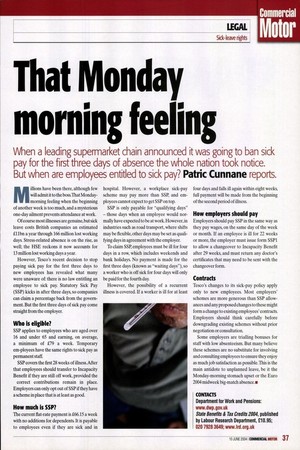That Monday
Page 31

If you've noticed an error in this article please click here to report it so we can fix it.
morning feeling
When a leading supermarket chain announced it was going to ban sick
When a leading supermarket chain announced it was going to ban sick
pay for the first three days of absence the whole nation took notice.
But when are employees entitled to sick pay? Patric Cunnane reports.
Millions have been there, although few will admit it to the boss.That Mondaymorning feeling when the beginning of another week is too much, and a mysterious one-day ailment prevents attendance at work.
Millions have been there, although few will admit it to the boss.That Mondaymorning feeling when the beginning of another week is too much, and a mysterious one-day ailment prevents attendance at work.
Millions have been there, although few will admit it to the boss.That Mondaymorning feeling when the beginning of another week is too much, and a mysterious one-day ailment prevents attendance at work.
Of course most illnesses are genuine, but sick leave costs British companies an estimated £11bn a year through 166 million lost working days. Stress-related absence is on the rise, as well; the HSE reckons it now accounts for 13 million lost working days a year.
However, Tesco's recent decision to stop paying sick pay for the first three days to new employees has revealed what many were unaware of: there is no law entitling an employee to sick pay. Statutory Sick Pay (SSP) kicks in after three days, so companies can claim a percentage back from the government. But the first three days of sick pay come straight from the employer.
Who is eligible?
SSP applies to employees who are aged over 16 and under 65 and earning, on average, a minimum of £79 a week. Temporary em-ployees have the same rights to sick pay as permanent staff. SSP covers the first 28 weeks of illness.After that employees should transfer to Incapacity Benefit if they are still off work, provided the
correct contributions remain in place. Employers can only opt out of SSP if they have a scheme in place that is at least as good.
How much is SSP?
The current flat-rate payment is £66.15 a week with no additions for dependents. It is payable to employees even if they are sick and in
hospital. However, a workplace sick-pay scheme may pay more than SSP, and employees cannot expect to get SSP on top.
SSP is only payable for "qualifying days" — those days when an employee would normally have expected to be at work. However, in industries such as road transport, where shifts may be flexible, other days may be set as qualifying days in agreement with the employer.
To claim SSP, employees must be ill for four days in a row, which includes weekends and bank holidays. No payment is made for the first three days (known as "waiting days"), so a worker who is off sick for four days will only be paid for the fourth day. However, the possibility of a recurrent illness is covered. If a worker is ill for at least
four days and falls ill again within eight weeks, full payment will be made from the beginning of the second period of illness.
How employers should pay
How employers should pay
Employers should pay SSP in the same way as they pay wages, on the same day of the week or month. If an employee is ill for 22 weeks or more, the employer must issue form SSP1 to allow a changeover to Incapacity Benefit after 29 weeks, and must return any doctor's certificates that may need to be sent with the changeover form.
Contracts
Tesco's changes to its sick-pay policy apply only to new employees. Most employers' schemes are more generous than SSP allowances and any proposed changes to these might form a change to existing employees' contracts. Employers should think carefully before downgrading existing schemes without prior negotiation or consultation. Some employers are trialling bonuses for staff with low absenteeism. But many believe these schemes are no substitute for involving and consulting employees to ensure they enjoy as much job satisfaction as possible. This is the main antidote to unplanned leave, be it the Monday-morning stomach upset or the Euro 2004 midweek big-match absence. mi CONTACTS Department for Work and Pensions: www.dwp.gov.uk State Benefits & Tax Credits 2004, published by Labour Research Department, £10.95; 020 7928 3649; www.Ird.org.uk
























































































































































































